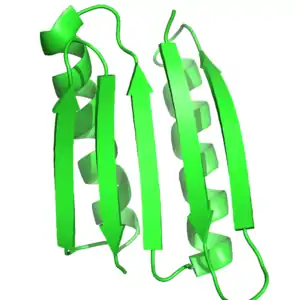Top7
Top7 is an artificial 93-residue protein, classified as a de novo protein since it was designed by Brian Kuhlman and Gautam Dantas in David Baker's laboratory at the University of Washington to have a unique fold not found in nature.[1] The protein was designed ab initio on a computer with the help of protein structure prediction algorithms. Determination of the high-resolution X-ray structure of the experimentally expressed and purified protein revealed that the structure (PDB: 1QYS) was indeed very similar (1.2 Å RMSD) to the computer-designed model. The structure consists of two alpha helices packed on a five-stranded anti-parallel beta sheet.

Top7 was featured as the RCSB Protein Data Bank's 'Molecule of the Month' in October 2005,[2] and a superposition of the respective cores (residues 60-79) of its predicted and X-ray crystal structures are featured in the Rosetta@home logo.
References
- Kuhlman B, Dantas G, Ireton GC, Varani G, Stoddard BL, Baker D (2003-11-21). "Design of a novel globular protein fold with atomic-level accuracy". Science. 302 (5649): 1364–1368. Bibcode:2003Sci...302.1364K. doi:10.1126/science.1089427. PMID 14631033.
- "October 2005 molecule of the month: Designer proteins". RCSB Protein Data Bank. doi:10.2210/rcsb_pdb/mom_2005_10. Retrieved 2017-01-15.